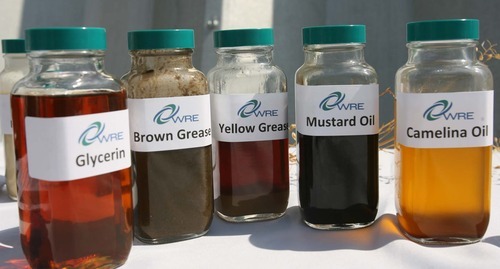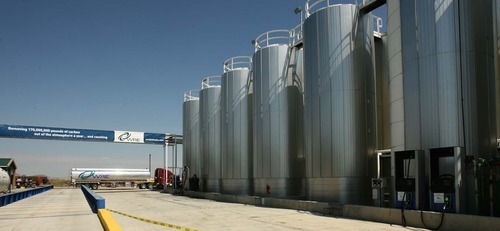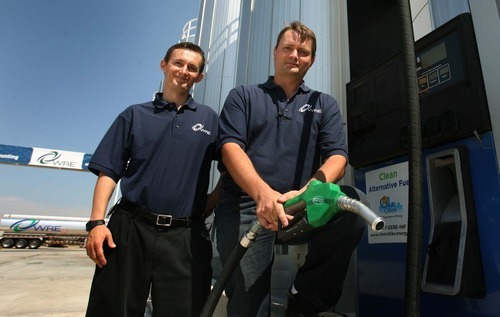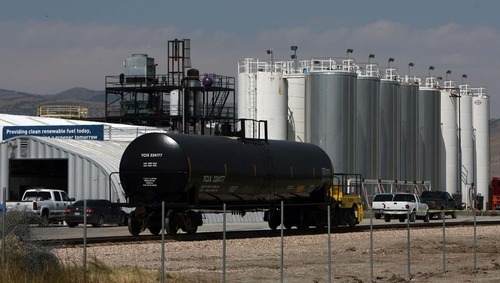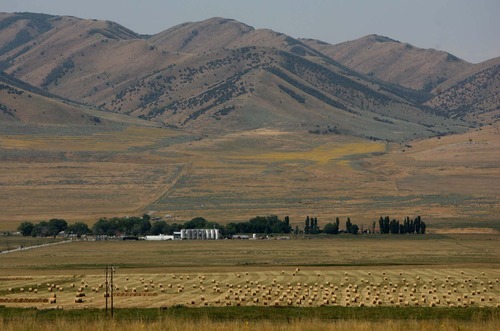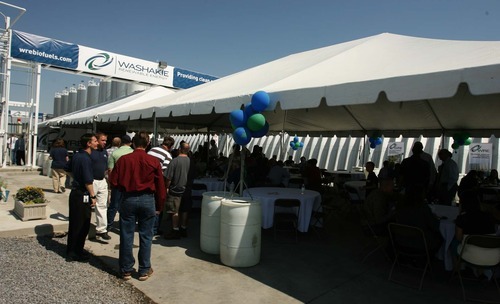This is an archived article that was published on sltrib.com in 2011, and information in the article may be outdated. It is provided only for personal research purposes and may not be reprinted.
Brothers Jacob and Isaiah Kingston on Thursday showed off their biodiesel production plant, the largest facility of its kind in Utah.
Workers at Washakie Renewable Energy spent a year building a system known as the green line process, which was showcased at an open house and will facilitate the production of up to 10 million gallons of renewable fuel annually. About 100 elected officials, industry representatives and guests toured the facility.
The plant uses feedstock, such as yellow and brown grease, animal fats and wastewater pond scum, to produce biodiesel, which is sold to local companies and fuel distributors.
The plant is in Plymouth, population 328, about 100 miles north of Salt Lake City. Fields are dominated by alfalfa, which the Kingston family hopes will one day be planted in oil-seed crops to be processed at the plant as biofuel.
President and CEO Jacob Kingston, 34, said the $10 million plant is producing green jobs, employing 65 people, and bringing in annual sales of $3 million.
He and his brother, 30, said that although loans were provided by the Bank of Utah, they also used their own personal resources to construct the plant, which opened in 2006.
Norman Fukui, the bank's commercial loan area manager, said the plant, which was largely "self-funded, is a very important economic addition to Box Elder County."
The brothers insisted that none of the financing came from their father, John Daniel Kingston, 56, patriarch of the wealthy polygamous clan who was jailed for beating his daughter into unconsciousness in 1998 after the girl, then 16, ran away from an arranged marriage to her uncle.
John Daniel Kingston, who pleaded no contest to child abuse and spent 28 weeks in jail, was on hand during Thursday's open house, proudly shooting photographs. According to court testimony, he has had 14 wives and 120 children.
The elder Kingston said his two sons' achievement in building and operating the plant came from loans "and their own hard work and good business decisions." He also said that while he has no direct involvement with the plant, he will be developing programs to help area farmers plant oil-seed crops, giving growers a reliable, steady income and feedstock for Washakie.
"The media has inaccurately portrayed my family," said John Daniel Kingston. "We are all about sustainability, self-sufficiency and contributing to the community."
Jacob Kingston earned a doctorate in mechanical and chemical engineering. His brother, who is plant CFO, earned a degree in economics.
Chris Tallackson, manager of the Utah Office of Energy Development, praised the Kingston brothers, saying the role they are playing in biofuel technology "will strengthen the future of Utah's economy."
Alan Weber, an adviser to the National Biodiesel Board, a Missouri-based trade association, said the Washakie plant is helping the industry meet its goal of producing more than the 800 million gallons of biofuel that the U.S. Environmental Protection Agency mandated for this year.
The industry also supports 31,000 jobs, generating income of nearly $1.7 billion that's circulated throughout the economy, he said.
Since the introduction of the $1-per-gallon biodiesel tax credit in 2005, U.S. biodiesel production climbed steadily until 2010, when Congress allowed it to lapse. Production immediately plummeted from a record of about 700 million gallons in 2008 to about 315 million gallons in 2010, according to the Biodiesel Board. The tax credit was reinstituted but is set to expire in December.
dawn@sltrib.comTwitter@DawnHouseTrib —
Washakie Renewable Energy
Where • Plymouth, Box Elder County
What • Largest biodiesel producer in Utah; 10 million gallons annually
Process • Grease, animal fat and wastewater are turned into biodiesel
Sales • $3 million last year
Employees • 65
Owners • Privately held by Jacob and Isaiah Kingston


